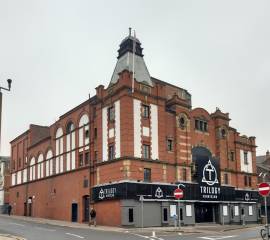Keeping police wolves from the match-day pub door
News that licensees in Wolverhampton felt "bullied" by the police into closing up prior
to the recent derby match with West Bromwich Albion is not really surprising. It has happened before, and it shows what a difficult situation this is for everyone concerned.
Closing a pub on a match day,
particularly in the centre of a busy city, can be a massive financial blow to the operator.
It seems to me that it should only be used as a last resort and then only when there is a clear indication that disorder or violence could result from serving supporters.
I am well aware that informal agreements are often entered into during the season for match-day closures.
Much of this is self-preservation in pubs that do not normally cater for supporters, and which do not want the bar wrecked by some mindless yobs who simply get back on a train to their own patch without a second thought.
That is a commercial decision, taken by the licensee. It is when some form of pressure is exerted by the police that the problems might occur.
I do understand that the police will often take the view that prevention is better than cure, and would rather an extra pub or two be "persuaded" to close than provide fuel for a riot.
But that means possibly one or two occasions when a cautious officer will lean too far and seek closures that are unnecessary.
The problem is that the police would prefer this informal approach than the statutory one provided in the Licensing Act, which requires a great deal of paperwork, evidence, procedures and an eventual visit to the magistrates.
While it is true that the Act allows them to take a pre-emptive strike, by issuing closure orders for pubs where they genuinely consider disorder may take place, that decision has to be soundly based and, according to the Act, not taken "in bad faith".
Although it would be difficult for an individual licence holder to take an action for damages on this point (and the police are specifically exempted from liability by the Act), there might come a time when the trade in an area considers police actions to be heavy-handed and decides to take a stand.
The informal approach, however, should not result in threats to the licence, as has been alleged recently. Bear in mind that this can only be a threat — it is not illegal to resist police advice to close, but it is an offence to defy a closure order and it is most inadvisable, as the matter will be brought before the magistrates and the licence will undoubtedly be reviewed by the council.
It is this potential threat that can be turned into "an offer you cannot refuse". Defying police advice in such a situation can lead who knows where.
It is a very brave licensee who defies the instruction and opens up, because he then faces the possibility of a statutory closure if trouble is heading his way.
There is another course that the police can take if they have firm evidence that a battle royal is on the cards. The magistrates still have their former power under the old licensing law to issue a blanket closure order for pubs in an area for up to 24 hours, on application by the police.
This procedure continues to be used, sparingly, in the case of match days in particular. But the police should, in my view, be accountable in some way for all closure actions, so that they are truly made only as a last resort.














